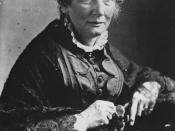A great 20th century author once said, "our humanity is our burden" (23). It is this encumbrance, however, that shapes the literature of two of the most powerful and influential authors of this era, Ralph Ellison and James Baldwin. Though they have opposing views on the role experience and sociopolitical agenda should play in art, both writers recognize the importance of these two factors and have been very vocal on their opinions about the matter. While Ralph Ellison recognizes that it is impossible to separate one's own experience from one's writing, he believes that politics should remain a separate force. He believes, however, that without art, experience and sociopolitical ideas are meaningless to the public. James Baldwin maintains that these components are not integral parts of literature and should be treated as separate matters. However, Baldwin was not naïve enough to believe that his writing had no political effect, or that he did not incorporate personal experience into his writing.
Ellison believed that all good fiction writers create of their own experiences, but they shape this, reworking as they build their works. Politics, however, has no place in literature according to Ellison. He understood political literature to be propaganda, while "art", which reflected experience, was inherently anti-ideological. Baldwin agrees with this stance, writing that "one writes out of one thing only - one's own experience" (7). Baldwin's own experiences as a black man living in white America are certainly reflected in his writing, and his criticisms, as expressed in "Everybody's Protest Novel," are based on these experiences.
In the autobiographical notes section of Notes of a Native Son, James Baldwin wrote that "the only real concern of the artist [is] to recreate out of the disorder of life that order which is art" (7). He goes on to say...



Thanks
good understanding of the issue, and a base for anyone researching the topic.
1 out of 1 people found this comment useful.